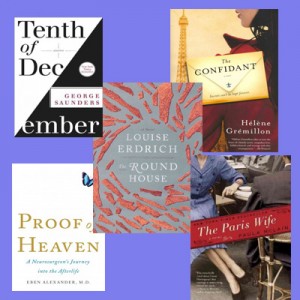Welcome to spring!
We’re honoring the season with romance, rebirth, and great stories about human resilience.
It might seem like a no-brainer to call Louise Erdrich’s The Round House one of the best books published in recent years–it won last year’s National Book Award, after all–but we’ll go the extra step and say that it took our breath away. Erdrich handles the most devastating of subjects with a wealth of humanity, humor, and depth. An Ojibwe teen seeks to bring his mother’s rapist to justice, and along the way awakens to the sweetness and sorrow of his community’s long-threatened, intricately formed, and ultimately loving soul.
Tenth of December, the much-anticipated collection by George Saunders, has been an Indie favorite since it was published, and the New York Times called it “the best book you will read this year.” With characteristically unconventional style, Saunders taps into more mainstream cultural questions and fears, from a teen thwarting the kidnapping of a neighbor to two families’ very different ways of viewing parenting and puppies.
The Confidant, by Hélène Grémillon, is a soft-spoken psychological thriller translated from the French. A young editor mourning the loss of her mother begins to receive epistolary letters. Are they a clever ploy for attention by a budding novelist, or an elaborate message from a sinister stranger?
Paula McLain’s The Paris Wife, a bestseller, is now out in paperback. This novel, based on historical fact, relates the romance, marriage, and eventual estrangement of Ernest Hemingway and Hadley Richardson, told from Hadley’s point of view. McLain sustains a lengthy and absorbing portion of the narrative exploring Hemingway’s fascination with bullfighting, weaving the conflicting passions of his artistic drive and intense love for Hadley throughout.
Eben Alexander, M.D.’s Proof of Heaven is another now-in-paperback bestseller, a memoir by a neurosurgeon who survived seven days in a brain-dead coma to relate his conviction that humankind’s spiritual existence is no ephemeral myth–it is the fabric of the universe. After relating his fantastic story, Dr. Alexander turns to the scientific process to analyze his own thesis, offering the conclusion that despite scientific resistance, human spiritual experiences encountered near death have a logical basis for acceptance.
Thanks for visiting.
